Charles E W Bean, Diaries, AWM38 3DRL 606/2/1 - January - March 1915 - Part 6
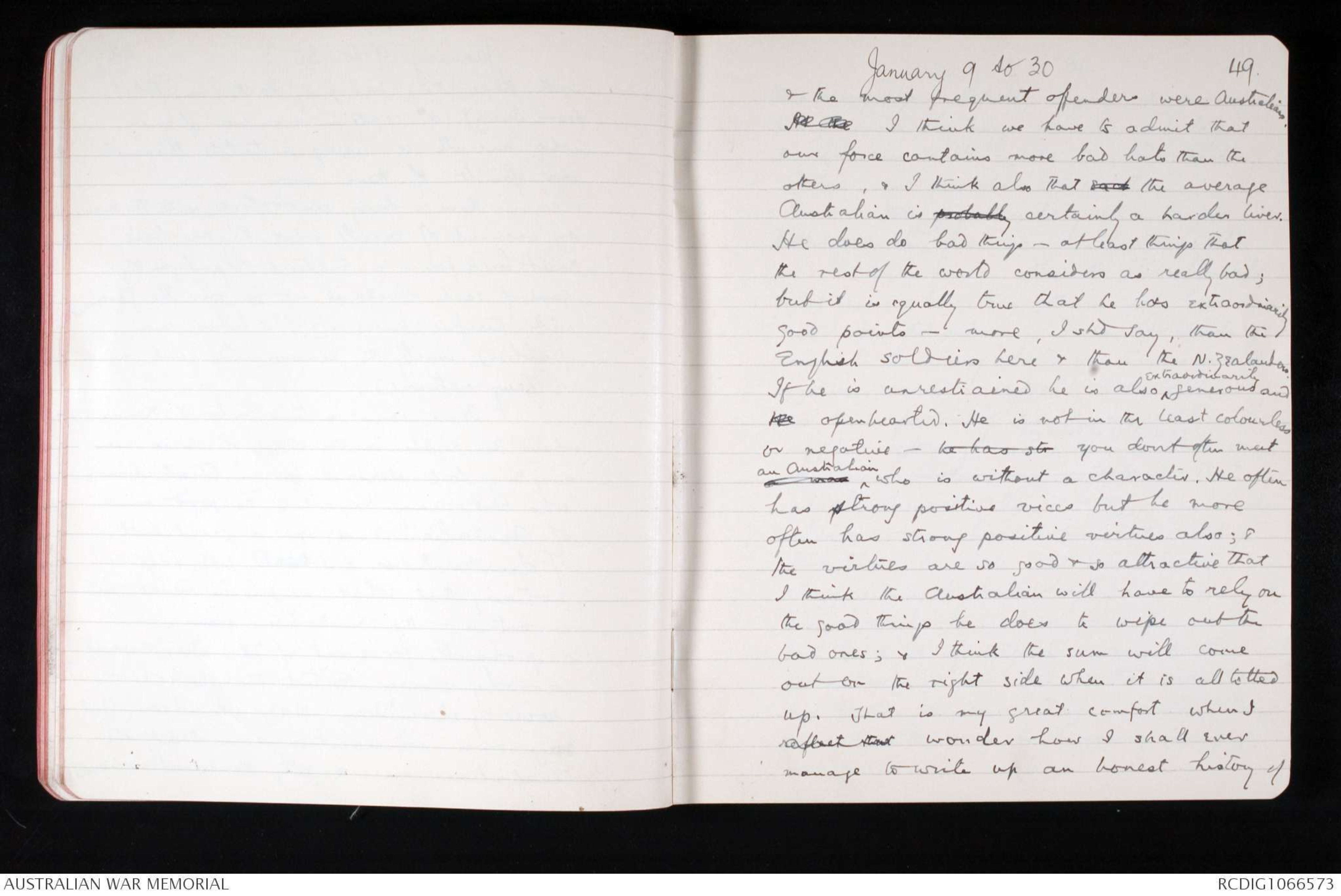
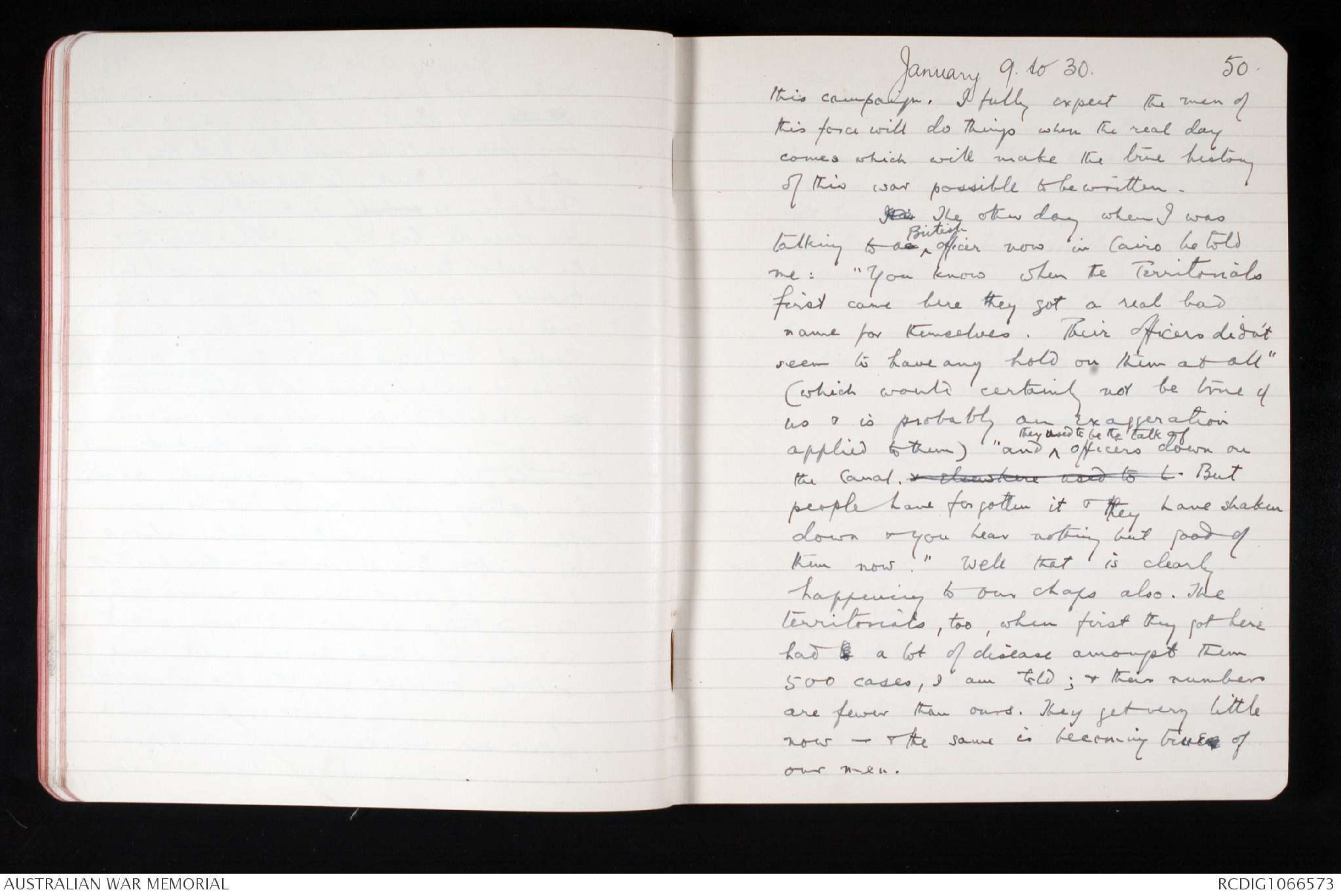
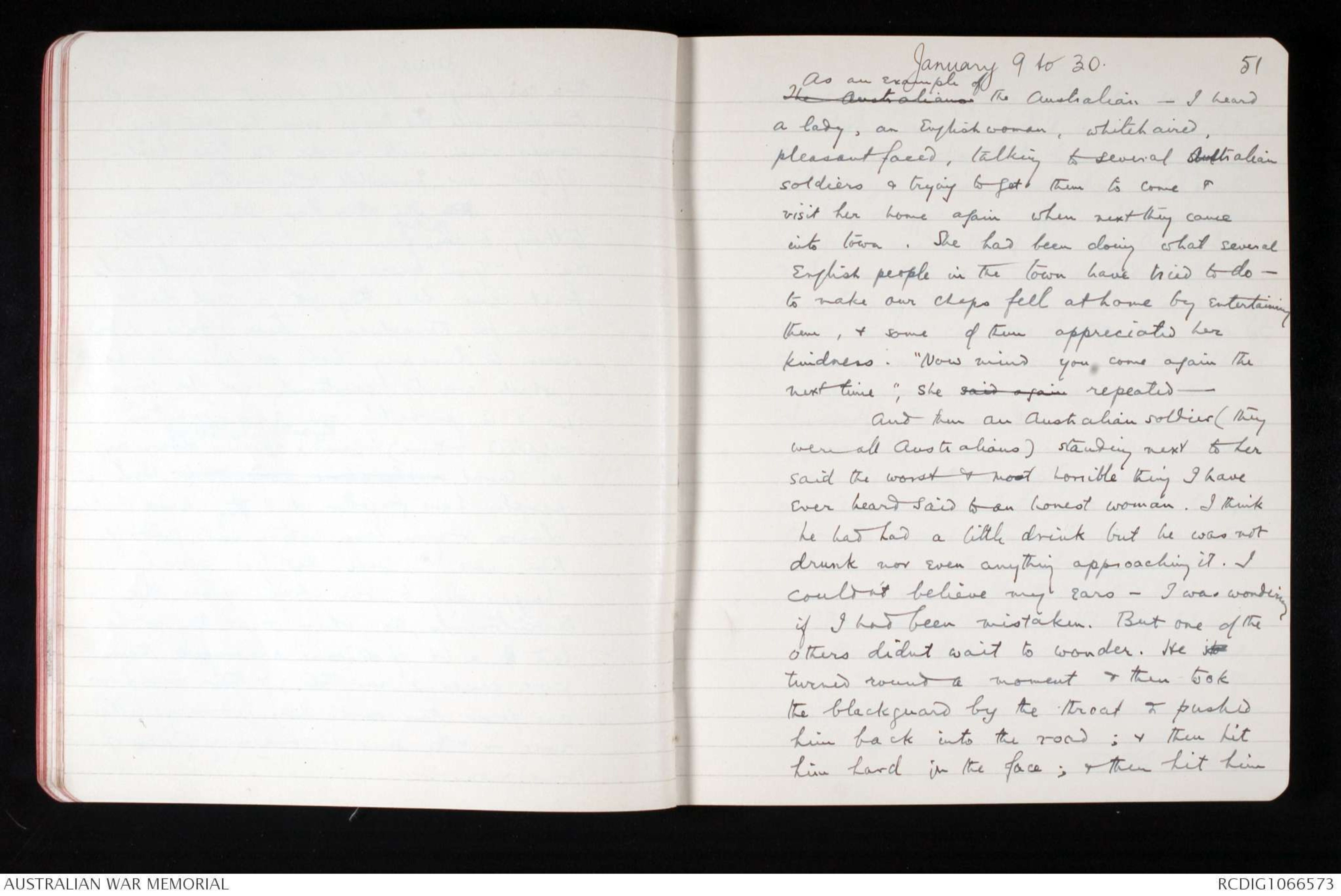
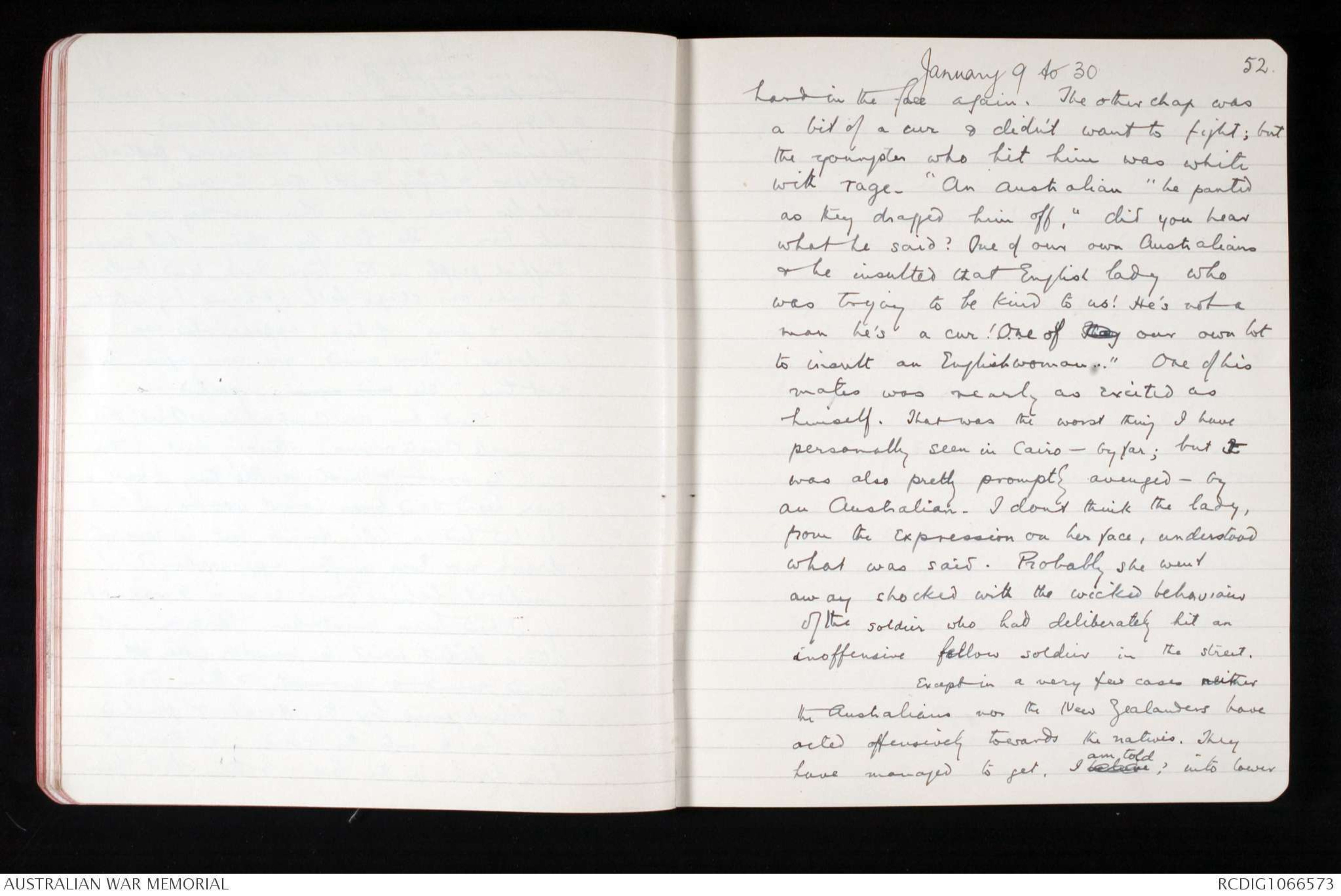
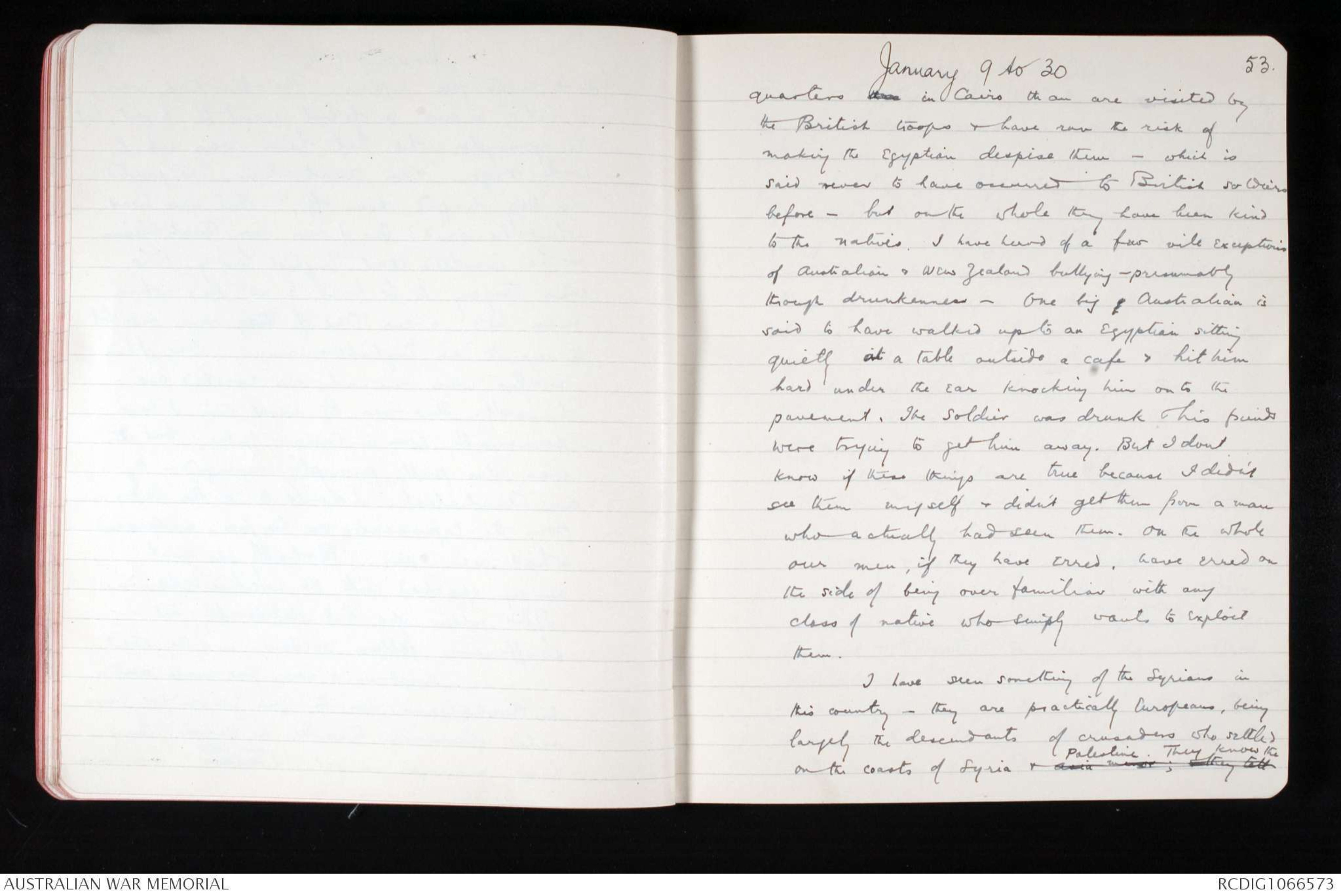
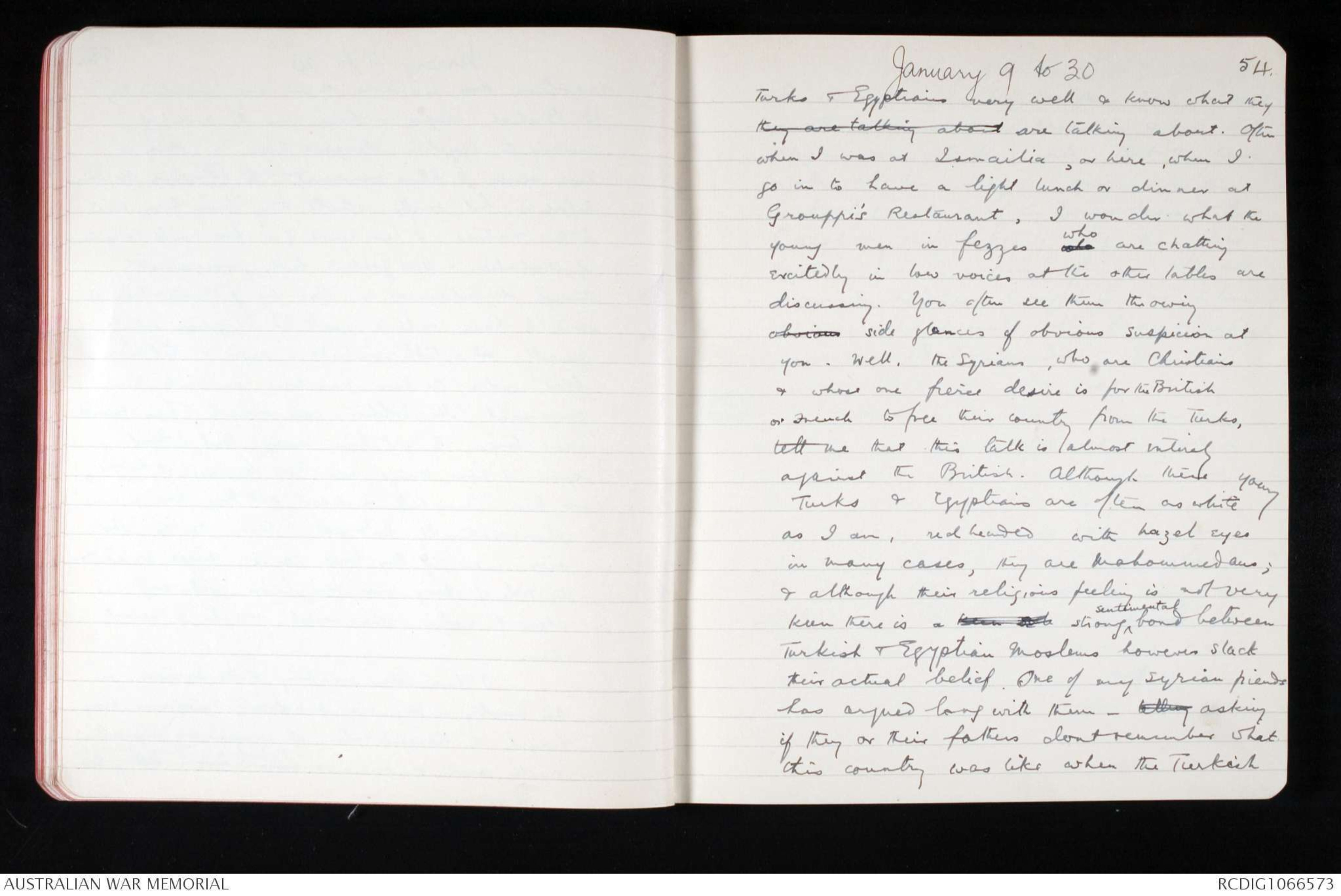
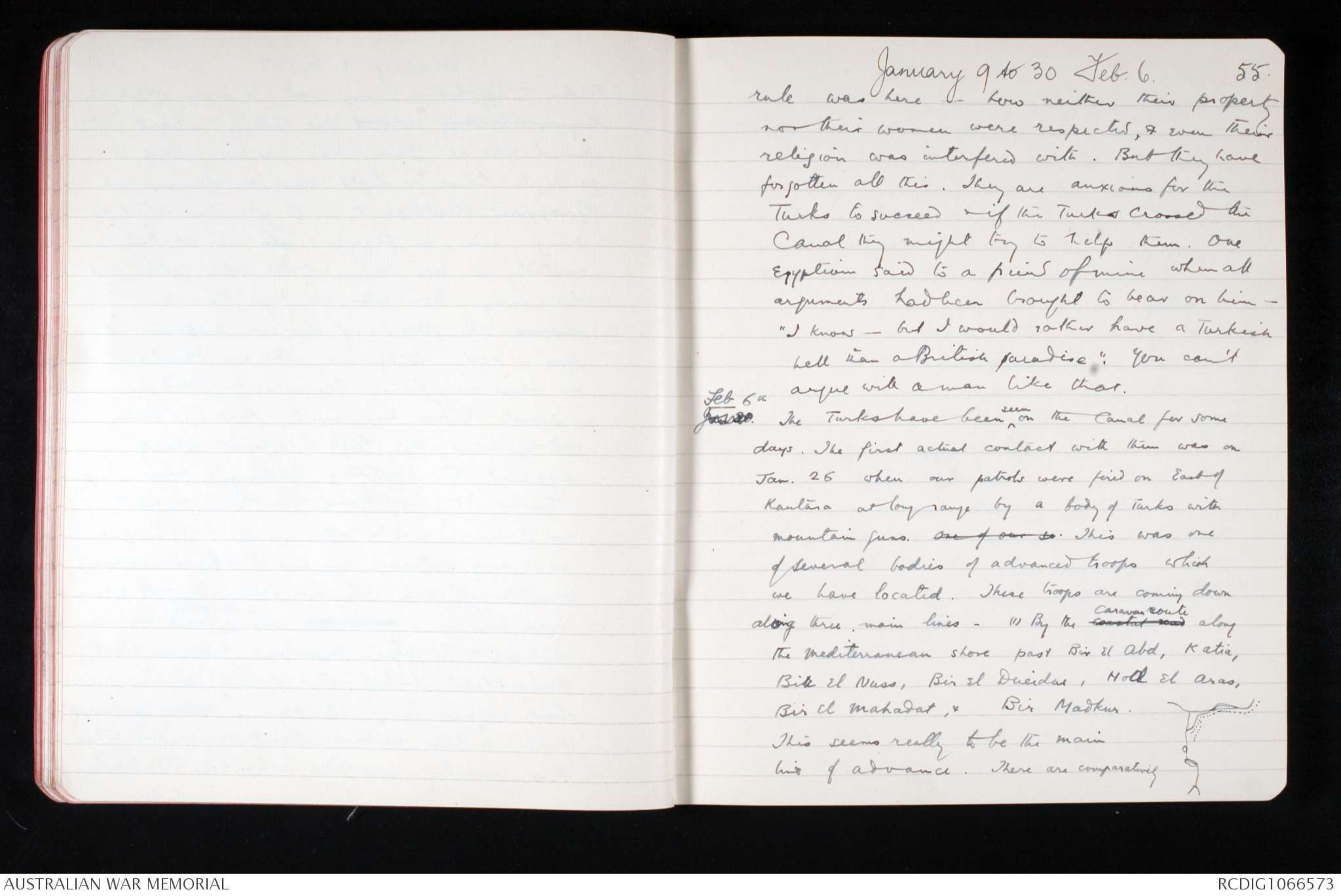
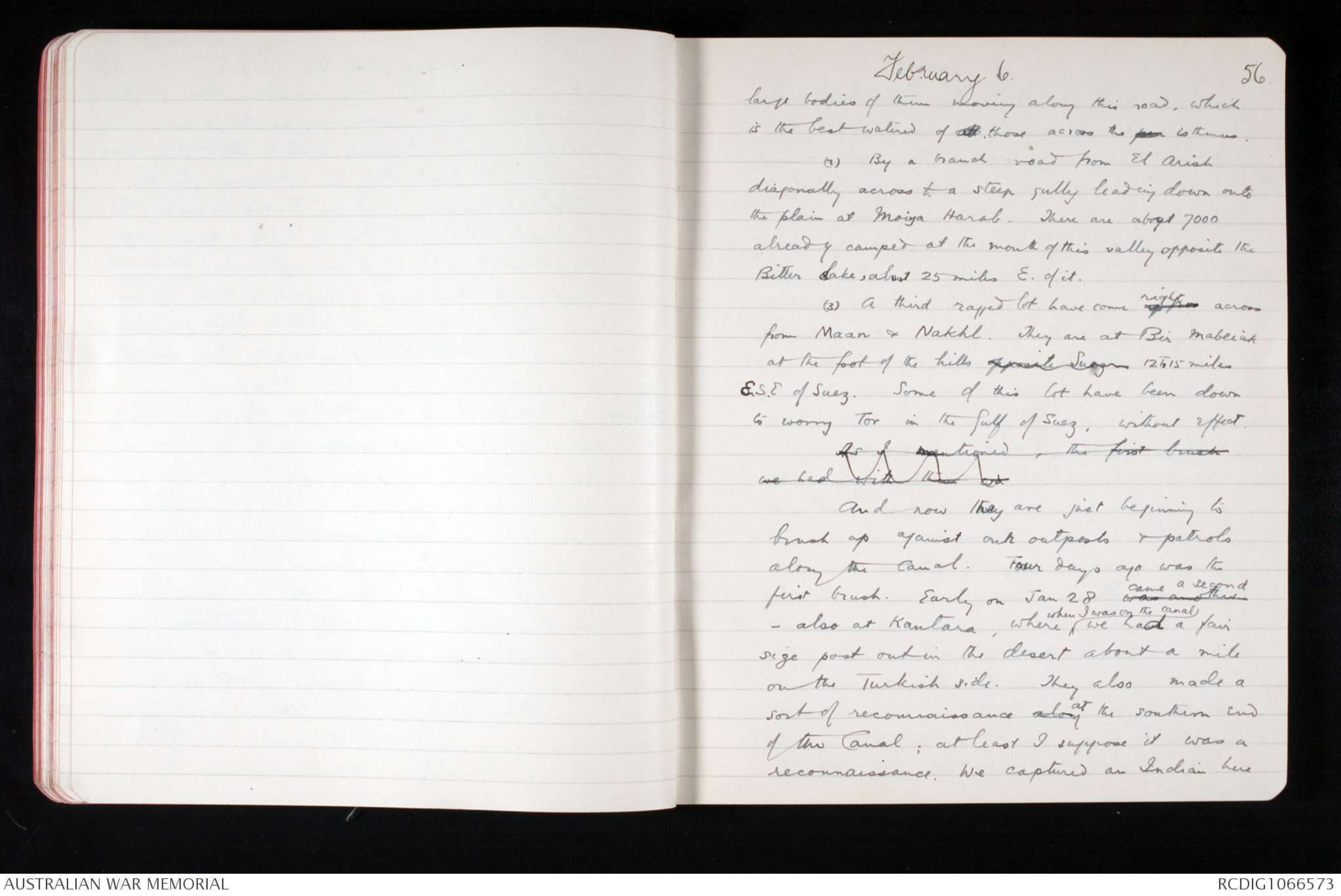
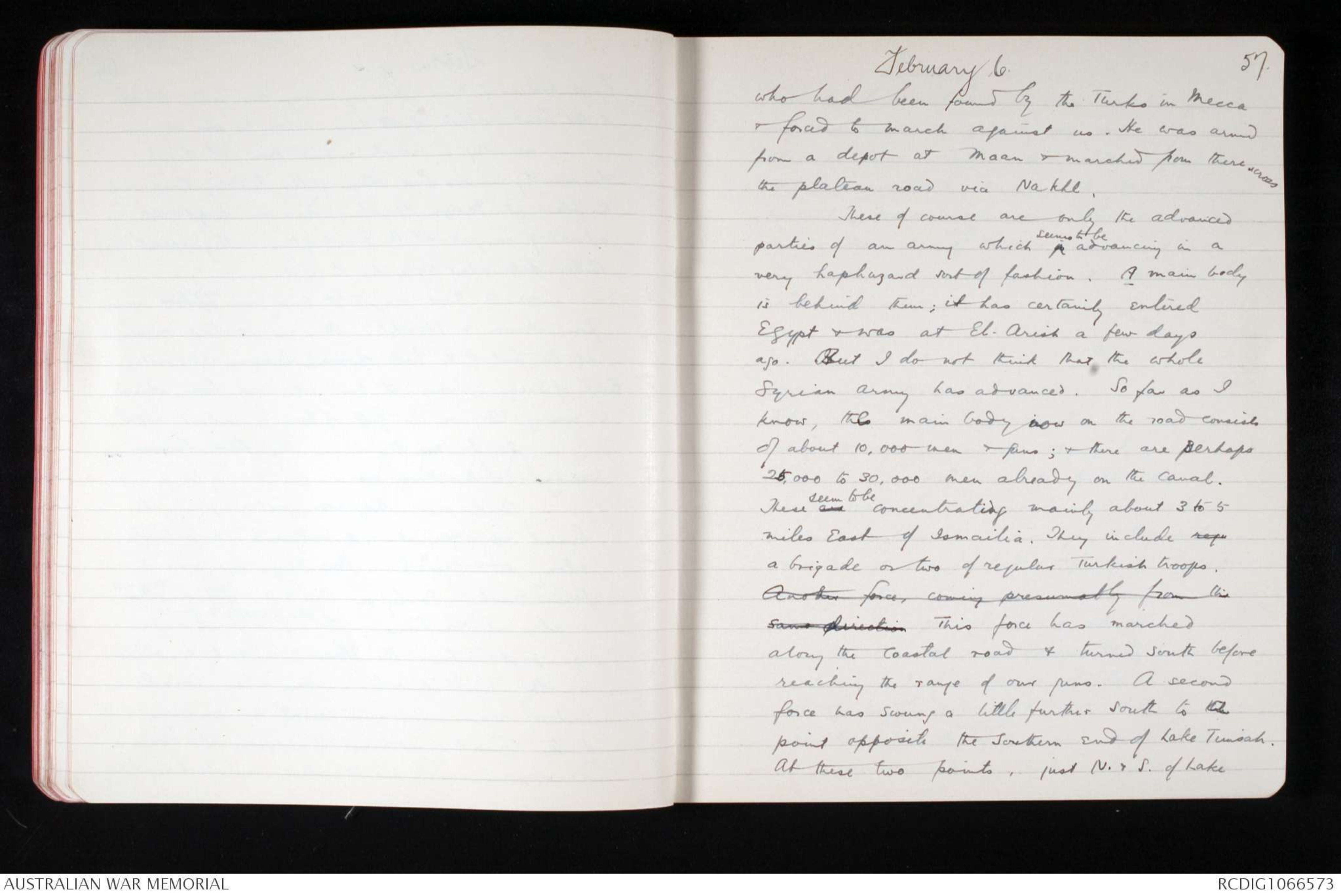
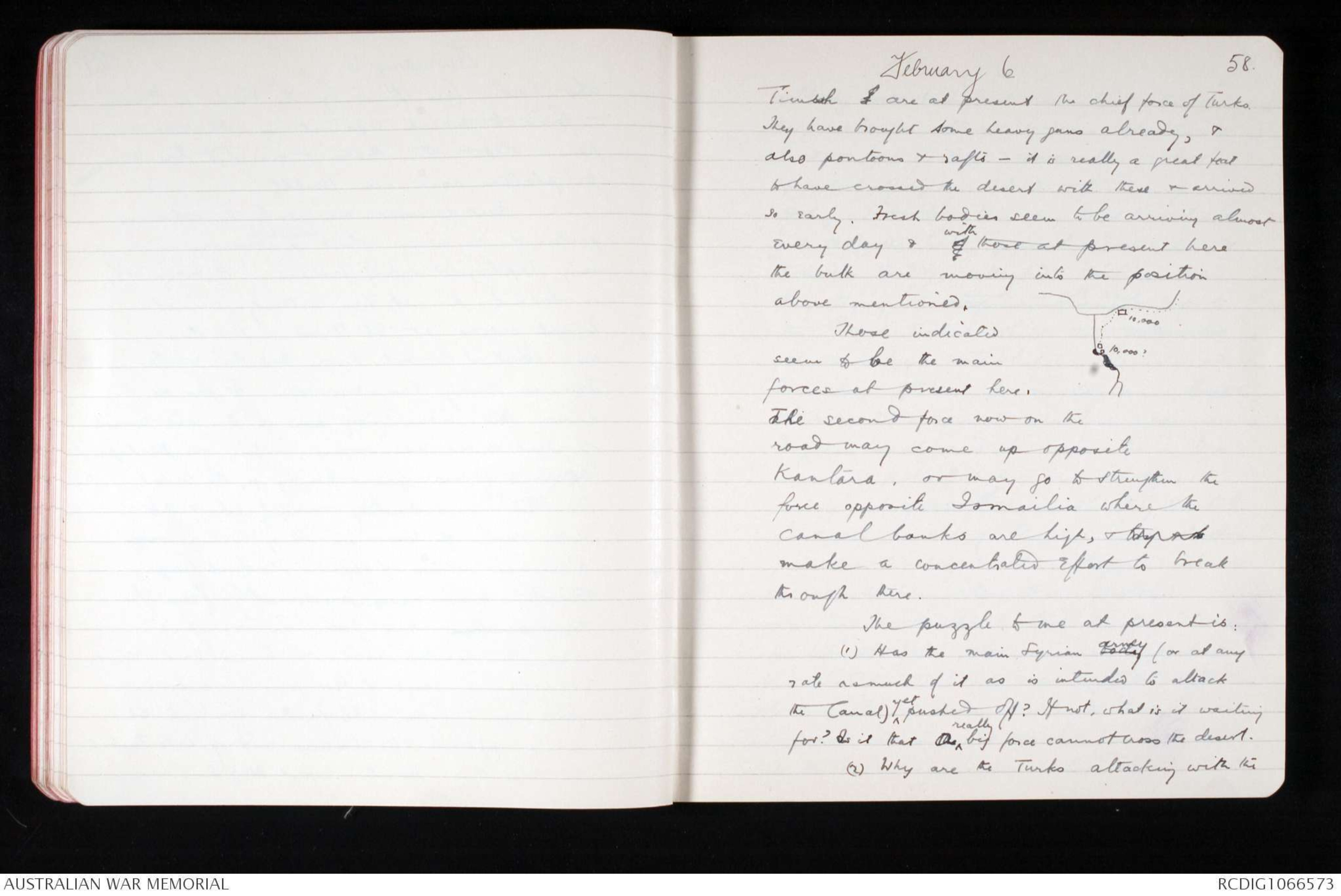
49.
January 9 to 30
& the most frequent offenders were Australians At the I think we have to admit that
our force contains more bad hats than the
others, & I think also that each the average
Australian is probably certainly a harder liver.
He does do bad things - at least things that
the rest of the world considers as really bad;
but it is equally true that he has extraordinarily
good points - more, I shd say, than the
English soldiers here & than the N.Zealanders.
If he is unrestrained he is also ^ extraordinarily generous and
He openhearted. He is not in the least colourless
or negative - he has str you dont often meeta man ^ an Australian who is without a character. He often
has strong positive vices but he more
often has strong positive virtues also; &
the virtues are so good & so attractive that
I think the Australian will have to rely on
the good things he does to wipe out the
bad ones; & I think the sum will come
out on the right side when it is all totted
up. That is my great comfort when Ireflect that wonder how I shall ever
manage to write up an honest history of
50.
January 9. to 30.
this campaign. I fully expect the men of
this force will do things when the real day
comes which will make the true history
of this war possible to be written.It is The other day when I was
taking to an ^ British officer now in Cairo he told
me: "You know when the Territorials
first came here they got a real bad
name for themselves. Their officers didn't
seem to have any hold on them at all"
(which would certainly not be true of
us & is probably an exaggeration
applied to them)" and ^ they used to be the talk of officers down on
the Canal. & elsewhere used to L. But
people have forgotten it & they have shaken
down & you hear nothing but good of
them now." Well that is clearly
happening to our chaps also. The
territorials, too, when first they got here
had b a lot of disease amongst them
500 cases, I am told; & their numbers
are fewer than ours. They get very little
now - & the same is becoming truer of
our men.
51
January 9 to 30.The Australians As an example of the Australian - I heard
a lady, an English woman, whitehaired,
pleasant faced, talking to several Australian
soldiers & trying to get them to come &
visit her home again when next they came
into town. She had been doing what several
English people in the town have tried to do -
to make our chaps feel at home by entertaining
them, & some of them appreciated her
kindness. "Now mind you come again the
next time", she said again repeated -
And then an Australian soldier (they
were all Australians) standing next to her
said the worst & most horrible thing I have
ever heard said to an honest woman. I think
he had had a little drink but he was not
drunk nor even anything approaching it. I
couldn't believe my ears - I was wondering
if I had been mistaken. But one of the
others didn't wait to wonder. He
turned round a moment & then took
the blackguard by the throat & pushed
him back into the road; & then hit
him hard in the face; & then hit him
52.
January 9 to 30
hard in the face again. The other chap was
a bit of a cur & didn't want to fight; but
the youngster who hit him was white
with rage. "An Australian " he panted
as they dragged him off," did you hear
what he said? One of our own Australians
& he insulted that English lady who
was trying to be kind to us! He's not a
man he's a cur! One of they our own lot
to insult an Englishwoman." One of his
mates was nearly as excited as
himself. That was the worst thing I have
personally seen in Cairo - by far; but it
was also pretty promptly avenged - by
an Australian. I don't think the lady,
from the expression on her face, understood
what was said. Probably she went
away shocked with the wicked behaviour
of the soldier who had deliberately hit an
inoffensive fellow soldier in the street.
Except in a very few cases neither
the Australians nor the New Zealanders have
acted offensively towards the natives. They
have managed to get, I believe am told ; into lower
53.
January 9 to 30
quarters there in Cairo than are visited by
the British troops & have run the risk of
making the Egyptian despise them - which is
said never to have occurred to British soldiers
before - but on the whole they have been kind
to the natives. I have heard of a few vile exceptions
of Australian & New Zealand bullying - presumably
through drunkenness - One big I Australian is
said to have walked up to an Egyptian sitting
quietly at a table outside a cafe & hit him
hard under the ear knocking him on to the
pavement. The Soldier was drunk & his friends
were trying to get him away. But I dont
know if these things are true because I didn't
see them myself & didn't get them from a man
who actually had seen them. On the whole
our men, if they have erred, have erred on
the side of being over familiar with any
class of native who simply wants to exploit
them.
I have seen something of the Syrians in
this country - they are practically Europeans, being
largely the descendants of crusaders who settled
on the coasts of Syria & Asia Minor; they tell Palestine. They know the
54.
January 9 to 30
Turks & Egyptians very well & know what theythey are talking about are talking about. Often
when I was at Ismailia, or here, when I
go in to have a light lunch or dinner at
Grouppi's Restaurant, I wonder what the
young men in fezzes who who are chatting
excitedly in low voices at the other tables are
discussing. You often see them throwingobvious side glances of obvious suspicion at
you. Well, the Syrians, who are Christians
& whose one fierce desire is for the British
or French to free their country from the Turks,
tell me that this talk is almost entirely
against the British. Although these young
Turks & Egyptians are often as white
as I am, redheaded with hazel eyes
in many cases, they are Mahommedans;
& although their religious feeling is not very
keen there is a keen to be strong ^ sentimental bond between
Turkish & Egyptian Moslems however slack
their actual belief. One of my Syrian friends
has argued long with them - telling asking
if they or their fathers dont remember what
this country was like when the Turkish
55.
January 9 to 30 Feb. 6.
rule was here - how neither their property
nor their women were respected, & even their
religion was interfered with. But they have
forgotten all this. They are anxious for the
Turks to succeed & if the Turks crossed the
Canal they might try to help them. One
Egyptian said to a friend of mine when all
arguments had been brought to bear on him -
"I know - but I would rather have a Turkish
hell than a British paradise". You can't
argue with a man like that.
Feb 6thJan 20
The Turks have been ^ seen on the Canal for some.
days. The first actual contact with them was on
Jan. 26 when our patrols were fired on East of
Kantara at long range by a body of Turks with
mountain guns. One of our so. This was one
of several bodies of advanced troops which
we have located. These troops are coming down
along three main lines - (1) By the coastal road caravan route along
the Mediterranean shore past Bir el Abd, Katia,
Bir el Nuss, Bir el Dueidas, Holl el Aras,
Bir el Mahadat, & Bir Madkur.
This seems really to be the main
line of advance. There are comparatively
[Hand drawn diagram - see original]
56.
February 6.
large bodies of them moving along this road, which
is the best watered of all those across the pen isthmus.
(2) By a branch road from El Arish
diagonally across to a steep gully leading down onto
the plain at Moiya Harab. There are about 7000
already camped at the mouth of this valley opposite the
Bitter Lake, about 25 miles E. of it.
(3) A third ragged lot have come up fro right across
from Maan & Nakhl. They are at Bir Mabeiuk
at the foot of the hills opposite Suez 12 to 15 miles
E.S.E of Suez. Some of this lot have been down
to worry Tor in the Gulf of Suez, without effectAs I mentioned, the first brushwe had with them ws
And now they are just beginning to
brush up against our outposts & patrols
along the Canal. Four days ago was the
first brush. Early on Jan 28 was another came a second
- also at Kantara, where ^ when I was on the canal we had a fair
size post out in the desert about a mile
on the Turkish side. They also made a
sort of reconnaissance along at the southern end
of the Canal; at least I suppose it was a
reconnaissance. We captured an Indian here
57.
February 6.
who had been found by the Turks in Mecca
& forced to march against us. He was armed
from a depot at Maan & marched from there across
the plateau road via Nakhl.
These of course are only the advanced
parties of an army which ^ seems to be advancing in a
very haphazard sort of fashion. A main body
is behind them; it has certainly entered
Egypt & was at El. Arish a few days
ago. But I do not think that the whole
Syrian Army has advanced. So far as I
know, this main body now on the road consists
of about 10,000 men & guns; & there are perhaps
25,000 to 30,000 men already on the Canal.
These are seem to be concentrating mainly about 3 to 5
miles East of Ismailia. They include regi
a brigade or two of regular Turkish troops.Another force, coming presumably from thesame direction This force has marched
along the Coastal road & turned south before
reaching the range of our guns. A second
force has swung a little further south to thea
point opposite the the Southern end of Lake Timsah,
At these two points, just N. & S. of Lake
58.
February 6.
Timsah I are at present the chief force of Turks.
They have brought some heavy guns already, &
also pontoons & rafts - it is really a great feat
to have crossed the desert with these & arrived
so early. Fresh bodies seem to be arriving almost
every day & of with those at present here
the bulk are moving into the position
above mentioned.
[Hand drawn diagram - see original]
Those indicated
seem to be the main
forces at present here.
The second force now on the
road may come up opposite
Kantara, or may go to strengthen the
force opposite Ismailia where the
Canal banks are high, & try & b
make a concentrated effort to break
though there.
The puzzle to me at present is:
(1) Has the main Syrian body Army (or at any
rate as much of it as is intended to attack
the Canal) ^ yet pushed off? If not, what is it waiting
for? Is it that thea ^ really big force cannot cross the desert.
(2) Why are the Turks attacking with the
 Marisa Bortolotto
Marisa BortolottoThis transcription item is now locked to you for editing. To release the lock either Save your changes or Cancel.
This lock will be automatically released after 60 minutes of inactivity.